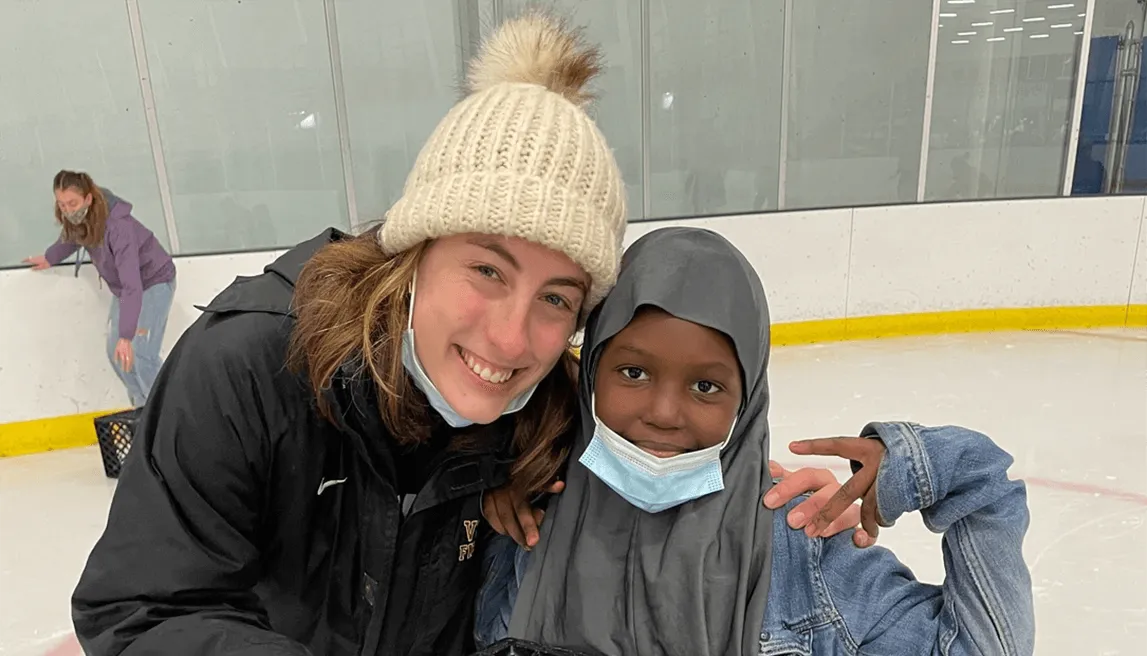The three young siblings can’t wait to paint.
They point to where the supplies are, and explain how to set up the pallets. They use every color to paint pictures for their friends at school. They paint themselves, each other, the table and me, while their older sister does homework across the room.
The four brothers and sisters are at one of the local chapters of DREAM, a nonprofit that serves families living in affordable housing. In Chittenden County, where DREAM has multiple offices, many families are new Americans. At the organization’s Elm Street location, UVM students mentor the kids as they acclimate to a new home.
UVM alumna Rebekah Silver is here with the four siblings, all from a family that moved to Winooksi from Tanzania. She knows all the families who live on Elm Street, many of whom have come from countries in Africa and South Asia.
Silver has served as a mentor at the Elm Street site for four years. She played varsity field hockey and majored in political science in college, and now she runs the Afterschool Enrichment program for the kids here.
Tonight, it’s painting.
“How about a little music?” she asks, before turning on “Could’ve Been Me” by The Struts.
DREAM stands for “Directing through Recreation, Education, Adventure and Mentoring.” The nonprofit aims to close the opportunity gap for youth between underserved and overserved families. DREAM achieves this through two-way mentoring relationships developed in afterschool activities, summer programs and camps.
The organization began in 1998 with AmeriCorps members and Dartmouth College students. Dartmouth alumnus Michael Foote founded the UVM chapters in 2001 and is now the chief empowerment officer, a recasting of the traditional CEO role. DREAM has sites throughout Vermont, in Philadelphia and Boston, and the group plans to continue expanding.
Along with mentoring and afterschool programs DREAM organizers facilitate translation services, tutoring, English language learning, humanitarian aid such as emergency food, post-secondary advising, camps and community events.
The mentors benefit from DREAM as much as the kids, as the program engages them in their communities and teaches them leadership skills. Plus, it’s fun.
The community center at Elm Street is filled with children’s art, photos, files, clothes, snacks and flags from the many countries representing the families. The night of my visit, one of the mentees shows me a DREAM pin from the center. She thinks it’s cool and likes to wear it because she’s proud to be a DREAMer, the name enrollees in the group call themselves.
The mentees tell me about their mentors, all UVM students. They love hanging out with them during the week and on weekends. The biggest hit is group programming on Fridays: baking cookies, ice skating, planning a trip to Boston.
But not every kid in the neighborhood can benefit from the programs. There aren’t enough mentors to serve them all.
Organizers trace the mentor shortage to the Covid-19 pandemic. Before the pandemic, plenty of people applied to be a mentor. But when Covid struck, would-be applicants decided against mentoring because of safety concerns.
DREAM leaders said they tried to engage youth online and by delivering activity packets, but many kids couldn’t access the materials, and the lack of one-to-one time hurt how engaged they could be. Families in affordable housing were disportionately affected by the pandemic and struggled to find childcare, find reliable transportation and make ends meet.
Now, DREAM is working to rebuild. The organization is recruiting full-time staff, mentors and volunteers. The group hopes to have every child enrolled in the program matched with a college mentor before April 1. As of mid-March, DREAM was short by a dozen UVM mentors, not including mentors for the kids on the waitlist.
At the community center that night, one of the mentees says she missed dance class at the O’Brien Community Center because she needed to go to the mall to help her mom translate. She tells me she wants to be an artist when she grows up, but she’s worried she won’t be able to financially support her brothers and sisters if she does. She is 9 years old.
The siblings suggest we bring home coloring supplies to their younger sister, who’s too young to join the program. We find a colored pencil and a stack of old paper and head out in the rain. The girls take my hands and laugh as we splash through puddles.
We arrive at their house, where their sister has been patiently waiting. She is 3 and is used to supervising herself. She won’t be able to join the program for another two years. She shrieks when she sees us and leaps into her sister’s arms.
“We brought you things to color with because we love you,” one of the older siblings tells her.
The oldest sister sits on the couch while her four younger sisters and two younger brothers bounce around, playing and laughing. They switch frequently between speaking English and Swahili.
The mentee who wants to be an artist brings out an old electronic keyboard. She taught herself how to play “Happy Birthday.” She performs for us while her siblings gaze. She says she wants to learn more songs. Because some families in the program don’t have birth certificates, some mentees get to choose when they want their birthday to be, or don’t celebrate their birthday at all.
The music is interrupted by a soft knock on the front door. The eldest daughter jumps up.
“Papa!” she cries.
In comes her father. They embrace.
“I haven’t seen my dad in three days,” she tells me. “He’s been at work.”
Their father greets me as if he expected me to be here, and I’m overwhelmed by his friendliness. The kids translate between their father and me. The evening slips away.
They all hug me when I leave. One of the littlest ones hugs my knees.
“Can’t you stay for another 10 hours?” she asks.
